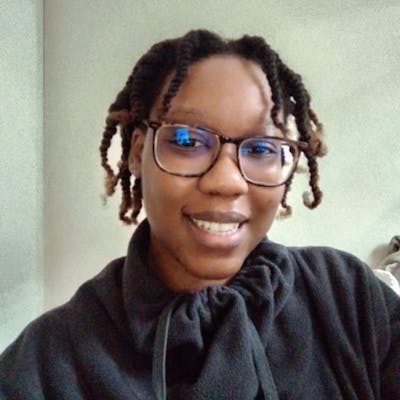Table of contents
- Motivation is hard when you’re self-learning
- Make it a goal to learn and not to earn a certificate
- For you to prioritize what’s important, you need to make sacrifices
- You need a great support system
- Give it your all
- Adopt a “can’t fail” mindset
- People come and go
- Ask in public if you want your questions answered
- Add value to others
You are what you think.
Reminds you of “you are what you eat”, doesn’t it?
This means that there is a direct relation between the thoughts that you think and the things that those thoughts lead you to do.
For example, if you think you can do a Spartan race then you can. But if you think you can’t do a Spartan race, then you’re right. You can’t. Of course, this is an oversimplification of the entire process involved in actually being able to run a Spartan race in the first place but you get the idea.
I had the privilege of co-hosting Dr Obed Ehoneah’s first Twitter space on Friday 16 June 2023. I was humbled because:
a) it was my first time co-hosting a Twitter space,
b) I'm a complete noobie to co-hosting and
c) Doc chose me from all the people he knows.
Here are my key takeaways from Doc that I learned from the space:
Motivation is hard when you’re self-learning
Everyone who is self-taught at something will tell you this for free. Self-learning is hard, especially if you don’t have a community of like-minded people to encourage you when you feel like giving up. It takes a lot of tenacity, endurance, determination and persistence to keep going when it’s not making sense.
Be kind to yourself. You won't always have the motivation to push yourself to study. That’s why it’s important for you to find your tribe, a community of like-minded people who you can collaborate with, help and be helped.
Also, remember why you’re learning software engineering or any topic for that matter. Remembering your why can motivate you to keep pushing when you’d otherwise give up.
Lastly, work on becoming a disciplined person. This looks different for everyone but could involve things like having a dedicated workspace, specific study time, putting your phone on airplane mode in another room so you don't have distractions, waking up early and studying at a time when you’re most alert and so on.
Make it a goal to learn and not to earn a certificate
It’s all well and good to have a certificate from an institute that says So and So did so many months at this place and is now qualified as a software developer but is that really why you went to the institution?
What is your goal for going to the institution? Is it to get the certificate or to actually learn and acquire the necessary skills to enable you to build whatever you have in mind to build? Dr. Obed highlighted this point way by emphasizing that our goal should be learning. The certificate becomes a by-product of the learning, not the reason for learning.
See the distinction?
Having a learning mindset will serve you well on your software engineering journey because you will never stop learning. This mindset will also help you stand out and add more value to others, especially your employer which we’ll touch on later in this article.
Remember, the goal is to learn and not to get the certificate.
For you to prioritize what’s important, you need to make sacrifices
Dr. Obed had a very busy schedule and in order for him to be able to focus his full attention on the software engineering program, he had to cut down on his busy schedule. This meant making sacrifices, and cutting back on many things, some of which he no doubt enjoyed very much.
If you want to become a software engineer, you’re going to need to make sacrifices, some big, some small. There’s no two ways about it. Nothing great was ever achieved without sacrifice.
What does prioritizing mean practically? It could mean cutting back on going out for social events with friends and family, cutting back on work hours (or maybe even quitting if you’re blessed to be able to do so), adjusting your wakeup and sleep times and such. Do what works for you so that you can benefit more from it.
You need a great support system
Dr. Obed was blessed to have a great support system in the form of understanding parents. If you’re an African child, you already know how African parents are when you’re not taking the conventional path in life. But best believe they’ll be blowing your trumpet when you excel in life 😀.
The importance of a strong support system cannot be overemphasised. It could be your immediate family like parents, siblings or aunts, uncles and cousins. Or maybe it’s a close friend or work colleague. Whoever your support system comprises of, be sure to reach out to them. Explain how much this software engineering program means to you and how they can best support you. You’d be surprised how willing people are to help you if you just ask. Shoot, I'm here to support you too.
Give it your all
Dr Obed gave himself two years to go all in tech to check if it was for him and see what came of that decision. He’s graduated from the ALX SE program as a software engineer and enjoys the work he does. It’s opened him up to many opportunities, one of which is working on the ALX Staff. He’s our very own superhero in my opinion 😀
It’s a great principle to live your life by, especially on your SE journey.
Make the choice to give it your all just this week. Put in the 70+ hours or however many you are able to put in to do your tasks. Do it properly. Find materials that work for your personality, be it videos, articles, books and/or peer learning. Be open to new methods of learning. Rather say “I can’t believe…” than “I wish…”
Adopt a “can’t fail” mindset
This was one of my favourite takeaways. Doc told himself that giving up was not a part of his one-year SE journey. He never looked at his pharmacist job as a backup should he fail. His only option was the SE program.
Are you selling yourself short by having too many options because you feel like you’re going to fail? How about doing the opposite and telling yourself there is no other option but this one? Of course, if you have responsibilities that involve other people, please don’t be reckless with their (your) lives. Be reasonable in whatever you decide but realize that the power to win is really in your hands. You can’t fail. Because you have determined this, you won’t. Remember what we said at the outset? If you think you can, you can and if you think you can’t, then you can’t.
People come and go
At the beginning of my cohort, we had 80k+ students but by the end of the second month, that number went down drastically to 9k. Yikes. Many of us have seen people come and go. This program is not for everyone and that’s okay. It can be discouraging to lose your peers along the road but it’s life. You won’t always reach the end with the people you started with but if you do find one or two people who have been with you since day one, hold onto them tight. They’re the real ones.
Ask in public if you want your questions answered
This one is surprisingly simple but often overlooked. I have found success sliding in Twitter DMs but I appreciate this point and will be doing more of it. It’s a good strategy because either the creator will answer your question or someone else in the community will answer. Either way, it’s a win-win because you got your question answered and it likely helped someone else. Here’s to asking in public more.
Add value to others
This is the last and most important gem I garnered from this space. Whatever you do, let it add value to others. For free. Don’t gatekeep. Share as much as possible with as many people as possible and it will open up doors of opportunities you never thought possible.
You could become a Twitter influencer or get a job or host Twitter spaces with well-known figures. The possibilities are endless.
Because he put himself out there by helping people for free, adding value to them and the community at large and documenting his journey online, Dr. Obed caught the eye of Julien, his current employer and founder of Holberton and had a job even before graduating from the program. If that’s not a boss move, then I don’t know what is.
Employers want to know how you can add value and not that you have a certificate. The best way to showcase your value is by building apps, a community, helping others, being active online, doing something proactive that shows you’re not all talk no action and so on. Add value and the money will follow.
In short:
Shoot your shot.
Put yourself out there.
Help someone, or two or three or twenty.
Document your journey.
Build in public.
Ask questions.
But most of all, have fun.
The SE journey is hard, long and can seem endless. But the joy you’ll have at the end of the day when you celebrate your newly acquired skills and can create something that impacts people’s lives positively is unmatched.
Feel free to listen to the space here and share your gems below.

